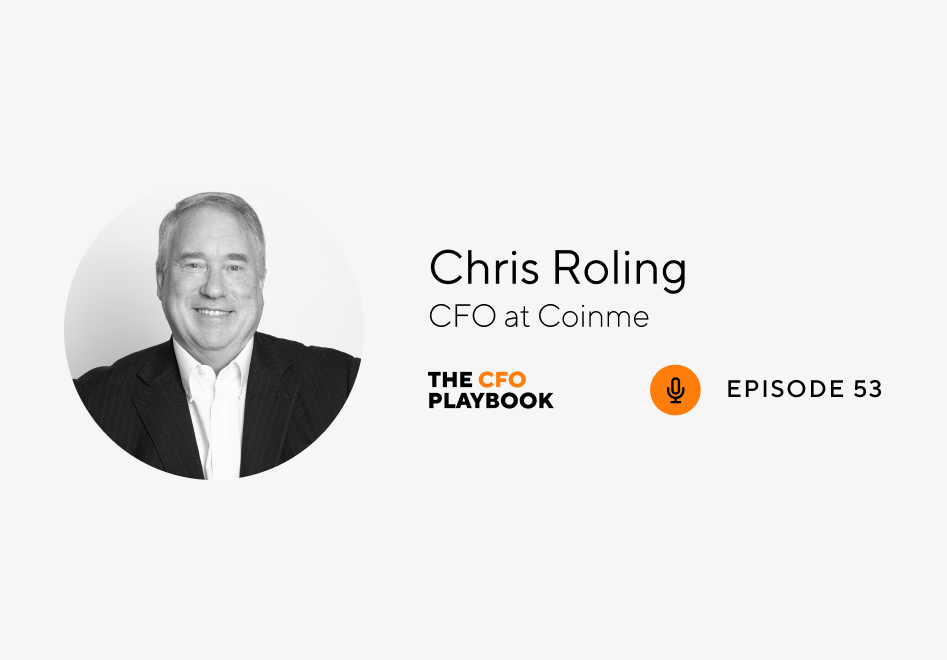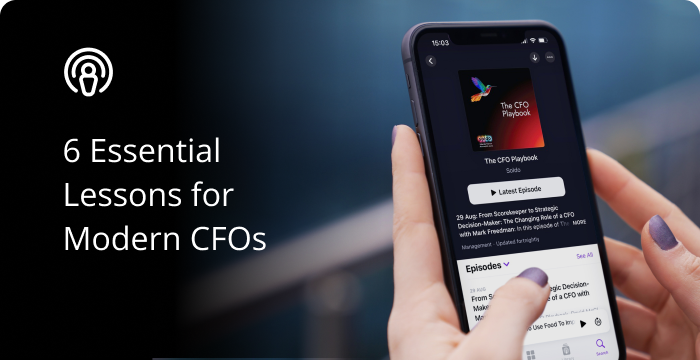To be a successful CFO, you may need to take chances and get out of your comfort zone. At the same time, but follow the philosophy of keeping it simple and not over-complicating things. A CFO is someone who provides a common sense approach to their company.
Chris Roling is CFO at Coinme, a crypto financial services and blockchain technology company that is dedicated to helping the world gain access to virtual currency. He has 35 years of commercial and private equity experience, having served in board, CEO, COO, and CFO positions with a number of global public and private companies. A self proclaimed, ‘global nomad,’ Chris has worked across the world for many different companies and verticals. His vast experience in nearly every functional area of finance, and mindset of taking the path less traveled, has allowed Chris to successfully guide and help Coinme prosper as it scales quickly in an expanding industry.
Chris joined The CFO Playbook to talk about his vast experiences working with companies around the world. He provides insight into the state of the cryptocurrency and blockchain industry, and how the technology is connecting people and companies throughout the world. As Coinme quickly scales as the crypto industry grows, Chris discusses his approach to working as a CFO with a startup and how to ensure success through a new and emerging market.
1. Freethinking when focusing your funding
A CFO needs to ensure accuracy in terms of cash burn and cash runway, but you don’t necessarily want to raise more than you need at lower valuations. You don’t want to risk ending up diluting your ownership, particularly if you’re a private company.
While you don’t want to raise more than you necessarily need, you’ve got to make sure you have an adequate runway in case the markets turn, or you’re not able to raise money when you need it later.
“There is no science to company valuation. You can triangulate, and I faced this as a private equity professional where I had the money. Quite frankly, that’s an easier side of the table to be on. Now, I find myself on the other side of the table where I’m looking for money, trying to raise money, and it becomes a negotiation. It’s more of an art rather than a science in terms of the valuation.”
Research and focus on customer value and the cost of customer acquisition. As long as you have the technology and data analytics, you will be in a much better place to situate your company and help it grow.
2. Move out of your comfort zone
To become a successful CFO you need to “take the leap of faith, jump off the bridge, and hope the rope holds.” There are many ways to do this. Learn about new areas of finance. Work in different industries and with companies of all sizes. Go international to learn about different cultures, people, and places.
Don’t be afraid of differences in location or company focus. In the finance function it is often the same no matter where you are in the world. The language might be a bit different, but the biggest difference comes in the size of a company.
“Somebody once said the road to success is always under construction. And I can’t tell you how many detours I’ve taken, how many U-Turns I’ve taken. I’ve run off the road, but you know, I’ve climbed back on when I’ve broken down. Basically, there is no one way. I think exploring the unknown, taking chances, is fundamental.”
If you or your team are having trouble taking on a risk, take a step back to take two steps forward.
3. Your team is as important as tech
While technology can be an important asset in helping you as a CFO, don’t discount the capabilities of human power. As you work towards becoming a CFO, step out and go into other areas. Raise your hand for projects out of your comfort zone.
Always be measured in whatever you do, understanding what are the facts available, and decipher what is the best return you can get with what you’re working on. A value-added piece of business or finance function is in the data with financial analysis and reporting space.
“It’s a natural trend I think for technology to, let’s just say, supplant to some extent the human resource side of things. But I’ve seen it go wrong. I’m a firm believer in the circle of life. And if I think what we need to do is serve the customer either externally or internally and use the technology to do that in the best way we can. And, where technology won’t allow, we do it the old fashioned way; You know, blood, sweat, and tears.”
Focus on business partnering, embedding yourself and your team in different parts of the business, being the eyes and ears of organization. The partnership with other functions and financial analysis brings a lot of added value and will assist decision making.
4. Networking is necessary
The people you meet and work with along your career are hugely important. Don’t ever burn bridges, because you never know when you might need the insight or assistance from someone in your network.
Maintain and cultivate relationships you gain over the years. They could help in so many areas, like recruiting, fundraising, and mentorship. People will become your greatest asset down the road.
“My greatest asset is the fact that I’ve worked in so many different companies, so many different countries, so many different functions, that I’ve built and maintained a network of colleagues, peers, and customers. It’s funny how the world is actually a very small place and you run across people that you dealt with 10 or 15 years ago. And fortunately I’ve maintained and I’ve cultivated that network and it’s paid off a thousand fold.”
In the end, the world is actually a small place and you never know who you may run across again.
Think big and plan ahead
A CFO needs to look out for the company’s future, financial best interest, and be a supportive partner to the CEO. That relationship is instrumental to success. Your job is to keep a lot of stuff off the plate of the CEO and avoid any surprises. The CEO needs the bandwidth to focus on the customer, company, and overall strategy.
When moving to a small company or startup your team becomes very important in terms of hiring. You want to look ahead of where you are at the moment, and hire for the big things to come. You have to find people willing to take a risk and grow with you and the organization.
Let us know what you think for a chance to win
Complete our short survey on The CFO Playbook for a chance to win either an 11-inch iPad Pro or a Samsung Galaxy Tab S7.











